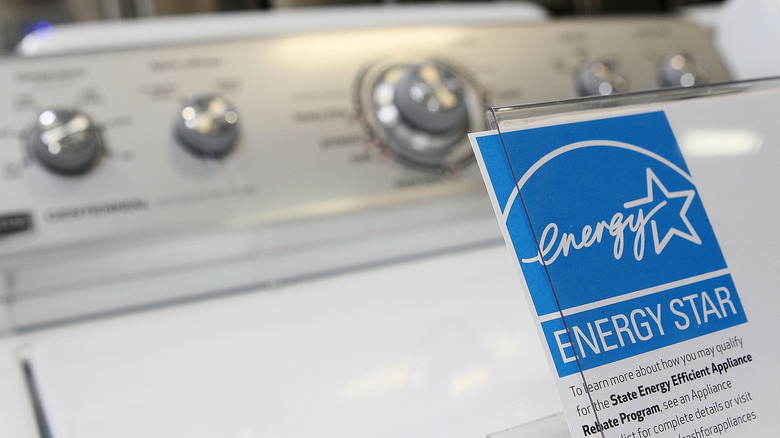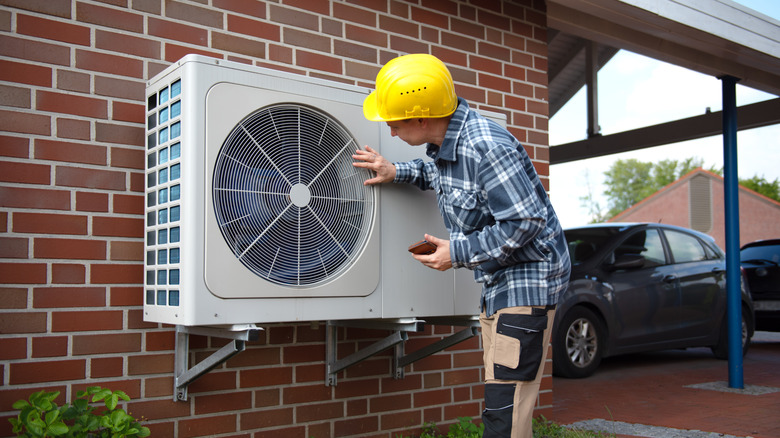HGTV's Mike Holmes Thinks Buying These Appliances Is A Waste Of Your Money
When you're seeking tips to prepare for a home renovation, you want ideas that will save some money, look great, and be smart long-term investments. One of the best experts for this type of advice is Mike Holmes, who is a contractor with decades of experience helping people remodel their homes the right way, as featured on the HGTV show "Holmes on Homes." Many of Holmes' recent projects away from the TV show focus on appliance and home designs that are green and sustainably use energy.
He says things like switching to LED light bulbs and using programmable thermostats help you save some money on energy costs. But Holmes says if you're not incorporating energy-efficient appliances into your home remodeling design, you're going to waste money in the long run. Although energy-efficient appliances frequently have a higher upfront cost than older designs that don't focus on energy savings, they make up for it with lower operating costs. Older designs will cause you to waste money on higher utility costs versus energy-efficient models.
"Energy-efficient appliances are designed to reduce energy consumption, reduce their impact on the environment, and reduce your utility bills," Holmes writes in his Make It Right blog. "Compared to average models, you can see upwards of $100 per year in savings." Considering most home kitchen appliances and heating and cooling systems can last anywhere from 10 to 20 years, saving $100 per year in reduced energy costs per appliance can add up quickly. Mike Holmes recommends selecting kitchen, plumbing, and heating and cooling appliances that focus on energy savings to make good long-term investments.
Focus on kitchen appliances that save energy
Mike Holmes emphasizes one piece of advice when selecting kitchen and plumbing-related appliances. "Look for ENERGY STAR-rated appliances," he writes in his Make It Right blog. The U.S. Environmental Protection Agency administers the ENERGY STAR program. Since the program's inception in 1992, Americans have saved $500 billion in power costs with these appliances. You can visit the ENERGY STAR website to find certified products. Some energy-efficient appliance can even qualify you for tax credits and rebates, and the ENERGY STAR website has additional information on these programs.
Beyond finding ENERGY STAR-rated appliances, the Mike Holmes Inspections blog suggests calling a home inspection professional to do an energy audit. Although the things home inspectors typically look for during a visit include foundation damage and roof problems, they can also make suggestions on areas for improvement for your power consumption. Requesting a home energy audit like this could cost $300 to $500, but you potentially can save a lot of money if you identify several areas that are costing you money. If you're remodeling a home, for example, you might want to replace appliances that the energy audit identifies as poor performers for power usage, helping you save money over the long run. "Newer, energy-efficient appliances use less energy to perform the same tasks as older models, resulting in lower electricity bills," the Mike Holmes Inspections blog says. "A home inspection can help you identify which appliances might need upgrading."
Upgrading to modern heating and cooling systems is a money-saver
It's common for a homeowner to spend an average of 43% of their utility costs on heating and cooling. Having inefficient appliances in this area can waste a lot of money. Mike Holmes makes a good point for installing a heat pump in your home, noting that they're much more efficient than other systems. The long-term savings can help you avoid wasting money compared to using a traditional furnace and central AC. "Heat pumps move heat rather than generate heat," Holmes writes in his Make It Right blog. "This makes them very energy efficient. In fact, a heat pump can reduce your electricity consumption by 50% compared to electric resistance heating."
Another area where Holmes believes you're wasting money by not focusing on energy efficiency is by using tank-style electric water heaters. Such appliances account for 18% of the power bill in an average home. If at all possible, Holmes recommends going with tankless gas-operated water heaters to save on operating costs. "Gas water heaters are less expensive to operate, due to the lower cost of natural gas," Holmes writes in his Make It Right blog. "If you live in an area where electricity rates are high, your electric tankless water heater will be more costly to operate." Tankless water heaters are especially efficient because they heat water only as you need it rather than constantly heating water while waiting for you to use it like a tank-type model does.


